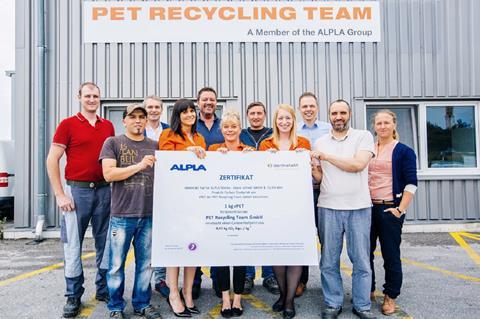
Recycled PET (rPET) from PET Recycling Team GmbH – a wholly owned subsidiary of ALPLA based in Wöllersdorf/Lower Austria – results in 79 per cent lower CO2 emissions compared to new material.
This is a significantly higher saving than previously assumed. A study conducted by denkstatt GmbH on behalf of ALPLA came to this conclusion. ALPLA, a leading international producer of plastic packaging solutions, has been working on PET recycling for over 20 years. Although the economic conditions for the recycling of plastic are currently difficult due to the low price of oil, ALPLA continues to follow this cornerstone of its sustainability strategy. To highlight the value of recycling PET plastic, ALPLA commissioned denkstatt GmbH to calculate the carbon footprint for rPET.
rPET reduces CO2 emissions and conserves fossil fuels
The result of the study exceeds previous assumptions. The rPET produced by PET Recycling Team GmbH in Wöllersdorf has a carbon footprint of 0.45 kg CO2 equivalent per kilogram of rPET. Virgin PET, or new material, accounts for a CO2 equivalent of 2.15 kg per kilogram. This corresponds to a CO2 equivalent of 1.7 kg or 79 per cent lower greenhouse gas emissions for rPET. Plant manager Peter Fröschel explains: ‘The savings for a single kilogram of rPET are enough to power a 13-watt bulb continuously for twenty days in the Austrian power mix.’
Entire recycling process examined in detail
The carbon footprint was calculated in accordance with ISO 14044, starting with the collection and sorting of used PET bottles, covering transportation to the recycling plant in Wöllersdorf, through to washing, processing and granulating. The analysis is based on the mass and energy balance (electricity and gas consumption) for 2016 at the Wöllersdorf recycling plant in Austria.
ALPLA invests in recycling
ALPLA has decades of experience in the recycling of PET, as well as in the processing of recycled plastics. ALPLA operates recycling enterprises at three sites – a joint venture in Mexico, the wholly owned subsidiary PET Recycling Team in Wöllersdorf and a new recycling plant built in southern Poland in 2013. The annual capacity of these plants is around 65,000 tonnes of food-grade rPET.
"We are witnessing a clear trend towards PET packaging. And not just in summer, when the beverage industry enjoys a boom due to hot weather," says Fröschel. This makes it all the more important to collect used packaging and return recyclable materials to the production process. "Our recycling plants play a key role in this regard," the plant manager concludes.
More info:













